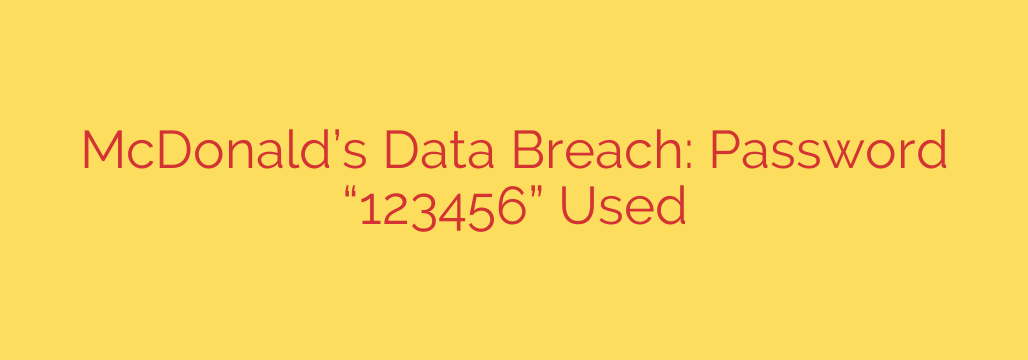
A Password as Simple as ‘123456’: Unpacking a Major Corporate Data Breach
In the world of cybersecurity, we often imagine sophisticated hackers using complex code to breach fortified digital walls. The reality, however, can be alarmingly simple. A recent data breach affecting employees of McDonald’s in Austria serves as a stark reminder that sometimes, the biggest threat isn’t a brilliant hacker, but a breathtakingly simple oversight: a password as weak as “123456.”
This incident is a powerful case study for businesses of all sizes, demonstrating how a single weak link can compromise an otherwise secure system. While the breach did not impact customer data, it exposed sensitive employee information and highlighted a critical vulnerability that many organizations overlook.
What Exactly Happened?
The security failure did not occur within McDonald’s main corporate servers. Instead, the vulnerability was found in a system managed by a third-party service provider—a company hired to run a promotional bonus program for employees. Attackers gained access to this external system because its login credential was the notoriously common and insecure password, “123456.”
Once inside, the unauthorized individuals were able to access a database containing the personal information of McDonald’s Austria employees who participated in the bonus program.
Key takeaways from the incident include:
- The point of failure was a third-party vendor, a common vulnerability known as a supply chain attack.
- The breach exposed sensitive employee data, not customer financial information.
- The entire security incident was made possible by the use of an extremely weak, default-like password.
The Real Danger: Your Security is Only as Strong as Your Weakest Password
This event powerfully illustrates a fundamental principle of cybersecurity: complexity is irrelevant if the basics are ignored. A company can invest millions in advanced firewalls, threat detection, and security teams, but all of that can be undone by one employee or one vendor setting a password that can be guessed in less than a second.
Weak passwords like “password,” “qwerty,” or “123456” consistently top the lists of the most common passwords found in data breaches year after year. Their use is a sign of poor cyber hygiene and a failure to implement and enforce basic security policies.
For any organization, this incident should serve as a wake-up call. It’s crucial to not only secure your own systems but to also scrutinize the security practices of every partner and vendor with access to your data. A supply chain attack exploits the trust you place in your partners, turning their security weaknesses into your own.
Actionable Security Tips to Protect Your Business
Learning from the mistakes of others is key to building a resilient security posture. Every business, regardless of size, should immediately review its policies to prevent a similar, easily avoidable breach.
Here are essential, actionable steps you can take today:
Enforce a Strong Password Policy. Don’t just suggest it—require it. Passwords should be long (at least 12-14 characters), complex (using a mix of upper/lowercase letters, numbers, and symbols), and unique for every service. Prohibit the use of common dictionary words or predictable sequences.
Implement Multi-Factor Authentication (MFA). This is one of the most effective security measures you can deploy. MFA requires a second form of verification (like a code from a phone app) in addition to a password. Even if a hacker steals a password, MFA would have prevented this breach.
Thoroughly Vet Your Third-Party Vendors. Before granting any outside company access to your data or systems, conduct a rigorous security audit. Ask for proof of their security policies, compliance certifications, and data handling procedures. Make security requirements a non-negotiable part of your service contracts.
Eliminate Default Credentials. Many software and hardware systems come with default administrative passwords like “admin” or “123456.” It is critical to have a strict policy that all default passwords must be changed during setup and before a system goes live.
Conduct Regular Security Training. Security is a team sport. Your employees are your first line of defense. Train them to recognize phishing attempts, understand the importance of strong passwords, and report suspicious activity. A well-informed team is far less likely to become an unwitting source of a breach.
Ultimately, this security failure is a lesson in fundamentals. It underscores that in the quest for robust cybersecurity, we must never forget the simple, foundational practices that keep the digital doors locked.
Source: https://heimdalsecurity.com/blog/mcdonalds-breach-news/








